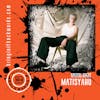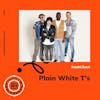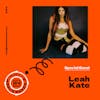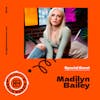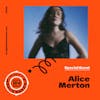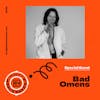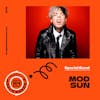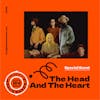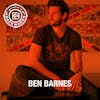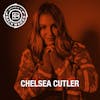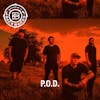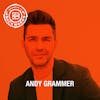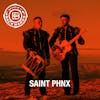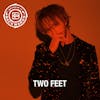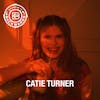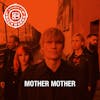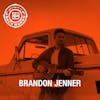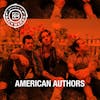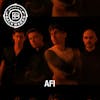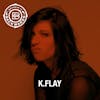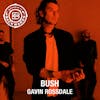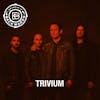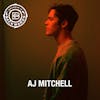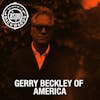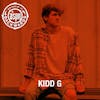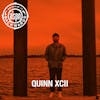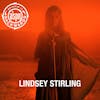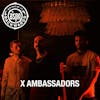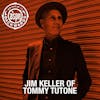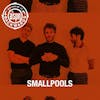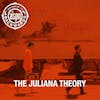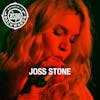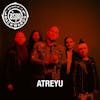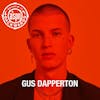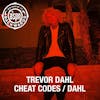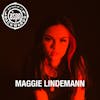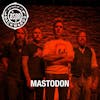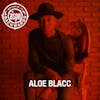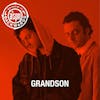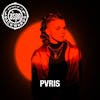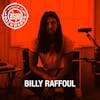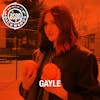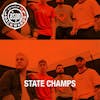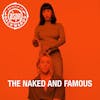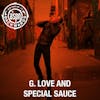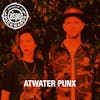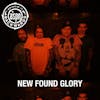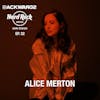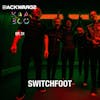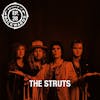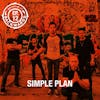Interview with grandma
We had the pleasure of interviewing grandma over Zoom video.
Following his April single “I Met God Online,” genre-bending alternative artist grandma releases “Blue Atlanta,” a dreamy ode to darkness and disengagement. grandma also announces his...
We had the pleasure of interviewing grandma over Zoom video.
Following his April single “I Met God Online,” genre-bending alternative artist grandma releases “Blue Atlanta,” a dreamy ode to darkness and disengagement. grandma also announces his next EP, “Angelhood” today, which is set for an August 19th release.
“Blue Atlanta is about the imaginative avenues I created at a time of extreme loss. When I began to hate my environment and my inner world grew dull all I could do was detach. The video is about unfolding and breaking away from the life I created that caused me so much pain. Whether it was friends dying to addiction or suicide I just felt the light went dimmer and dimmer,” says grandma of the track.
“I Met God Online,” released last month, chronicles the nonlinear nature of love in the digital age—failed talking stages, psychosexual pining, miscommunication and vibe shifts— intertwined with a fascinating strain of theism. ”I Met God Online” is about people’s fascination with internet esotericism,” says grandma. “A meditation on how someone’s life and internet presence can amorphously become someone else’s religion, obsession, or gospel.”
Hailed by Highsnobiety for “crafting music that pushes the notion of genre experimentation and fusion to unimaginably innovative heights,” grandma – a.k.a. multi-instrumentalist/producer Liam Hall – has earned applause for his fascinating amalgam of bedroom hip-hop, raw funk, alternative R&B, and lo-fi pop, showcased on 2019’s debut mixtape, Even If We Don’t Get It Together. The project – which features such groundbreaking tracks as “Stomp and Grind (Feat. Rico Nasty),” “Downtown Life,” and “Shallow Water,” – was followed in 2020 by an extensive string of chameleonic singles, including “Everybody’s On Their Phone,” which was featured on SiriusXM Alt Nation’s Advanced Placement and described by PAPER Magazine as a “reassuring and observant new song”, and “Virtually Anything,” an acclaimed collaboration with anti-pop star sophie meiers which earned acclaim from Nuance Magazine as “an extremely enticing track that is a must listen for any alternative/R&B fans.”
Known throughout Atlanta’s pop and hip-hop scenes for his skills as a singer, songwriter, musician, producer, programmer, arranger, and visual artist, grandma has received a wide range of media attention, with Pigeons & Planes naming him “Best New Artist of the Month” and A1234 declaring, “grandma, I have no doubt, will soon be the soundtrack to many people’s adolescence as his genre-defying talent speaks to a whole new generation of music lovers.” The preternaturally talented polymath maintained a steady flow of tracks through 2020, including “Chills,” “Bested,” and “Growing Up Is Strange”.
Now grandma is poised to push his distinctive brand of personal pop ever higher, reaching heavenward with a one-of-a-kind sound and vision unlike any other. Expect more music from this new chapter soon.
We want to hear from you! Please email Tera@BringinitBackwards.com.
www.BringinitBackwards.com
#podcast #interview #bringinbackpod #grandma #Angelhood #IMetGodOnline #BlueAtlanta #NewMusic #zoom
Listen & Subscribe to BiB
https://www.bringinitbackwards.com/follow/
Follow our podcast on Instagram and Twitter!
https://www.facebook.com/groups/bringinbackpod
We'd love to see you join our BiB Facebook Group.
Hello! It is Adam. Welcome back to bringing it backwards. A podcast where both legendary and rising artists tell their own personal stories of how they achieved stardom. On this episode, we had a chance to hang out with Liam, AKA grandma over zoom video lamb was born in new Orleans, live there till about nine. Actually, when Katrina hit is when him and his family left, they moved to Memphis for a couple months and then ended up moving to Georgia, spent the remainder of middle school, high school in Georgia college as well. And then I currently lives in LA, but he got into music. His dad is a musician, was a local musician in new Orleans that got him in a music. 3 (1m 57s): By the time he made it to Georgia, he was playing trumpet and piano and guitar. He ended up joining a band in, in Georgia when he graduated and was going to college. That's when he discovered producing and putting songs up onto SoundCloud, he said he didn't really have a big viral moment or a big moment on SoundCloud, but different. And our people were hearing his music and just knew how talented he was. So he started having meetings with different record labels. He talked about putting out his first few songs where he was out when the pandemic happened all about his most recent single blue Atlanta, the story behind the song and all about his debut EAP angel hood. 3 (2m 44s): You can watch our interview with Liam on our Facebook page and YouTube channel at bringing it backwards. It would be awesome if you subscribe to our channel like us on Facebook and follow us on Instagram, Twitter, and Tik TOK at bringing back pod. And if you're listening to this on Spotify, apple music, Google podcasts, it would be amazing if you follow us there as well, and hook us up with a five star review. 4 (3m 8s): We'd appreciate your support. If you follow and subscribe to our podcasts, wherever you listen to podcasts, 3 (3m 14s): We're bringing it backwards with grandma. Yeah, what's up? 5 (3m 18s): How's it going? 3 (3m 19s): I'm doing well. I'm doing well. How are you? 5 (3m 22s): I'm great. I love you. Oh, 3 (3m 25s): Got a piece of steak. 5 (3m 27s): Yeah, I totally forgot about this. This was from a conference. Let me sit. I can turn it off on me. 3 (3m 37s): Oh, that's hilarious. You can leave it up. I think it's oh yeah. 5 (3m 41s): Yeah. That's fine. Yeah. As it is. 3 (3m 43s): Yeah. As it is. I think it's creative. 5 (3m 45s): Super rare. 3 (3m 47s): Super rare. Rad dude. Well, I appreciate this. My name's Adam, and this is about you and your journey and music. And we'll talk about the EAP that's coming out. Oh, I think in about a month, right? A little over a month. 5 (4m 1s): Yeah. July 15th. 3 (4m 3s): Sweet. 5 (4m 4s): Sweet. That's the plan. How are you? 3 (4m 7s): I'm doing well. I'm doing well. 5 (4m 8s): You're in, are you in Nashville? 3 (4m 10s): Yeah. Nashville. Oh, well thank you. Yeah. Whereabouts are you? Are you LA? 5 (4m 18s): Yeah. I'm in Los Angeles. I moved here in January. 3 (4m 23s): Oh, cool. I'm originally from Atlanta. 5 (4m 26s): Yeah. I'm from, from Marietta, Georgia. About 25 minutes north of the city. Dark suburban place. Good times. And before that I grew up in new Orleans. 3 (4m 39s): Okay. Where are you born and raised in new Orleans. 5 (4m 41s): I was until, until I was nine and kinda jumped, jumped to Atlanta after Katrina. 3 (4m 52s): Cool. Oh, hi Gabby. Hey Gabby. Okay. Here. No audio. 5 (5m 4s): That's okay. Well, very cool. This is the podcast. Is this recording right now, 3 (5m 15s): But I'll cut out the beginning. We'll just restart. 5 (5m 17s): No, that's all good. I like digital footprint. You know, keep it here forever. So to stay, 3 (5m 24s): It's here to stay, but I'll edit it rad. Awesome. I don't know. What's wrong with something. My mic. All good. Gabby. Thank you so much. We'll just rock if that's cool. 5 (5m 42s): So you moved to Nashville and when was this? 3 (5m 46s): I moved to Nashville in February of 2021. 5 (5m 50s): Okay. Well, yeah. Yeah. My, my grandparents lived there really? Yeah. And they're always, they're always complaining about this. It's like a thousand people a day. Moving here. 3 (5m 59s): All of us Californians. Yeah. Over. Yeah. I agree. It's funny because when we moved here, I had no idea that that was a thing like that. All of California was moving here. I just happened to fall in line with my wife and our kids and everything that we were planning on doing anyway. And we got here and every time I'd made something like, oh, you know, next to me, I just moved here. They're like, let me guess you're moved from California. I'm like, yeah. 5 (6m 29s): Yeah. 3 (6m 30s): They're like, you're like the a hundred 20th person I've seen today. That's from here. I'm like, oh, okay. I'm sorry 5 (6m 35s): Over it. Yeah. It's it's yeah. It's such a, it's such a, a, a, it's a such a specific place. I do you get isolated there? I mean, I mean, I, I love it, but I feel like sometimes when I'm landlocked, it gets, I get a little weird, but 3 (6m 51s): Definitely isolated, I would say, cause I don't even, I don't live in Nashville. I live south in the suburbs. I have two kids. So we wanted to get them, you know, schools down here and, and all that and have more space. And, and that whole thing. Cause we're, I'm originally from San Diego. I lived in San Francisco for a little bit of time, back to San Diego. And then my wife is from San Diego and our kids were born in San Diego. So like, that's all we knew is California. So we moved here and we're like, oh, it's like nice to have space and greenery and, and people that are nice all the time. She let you get it, like let your car in like just like little things. I was all new to me. 5 (7m 30s): Yeah, yeah, yeah. Yeah. I mean, it's, it's, it's it's war, it's war out there. So 3 (7m 36s): It's just interesting that every, that everyone's moving here, which I had no concept of. 5 (7m 41s): Yeah. It's a, it's a great place though. 3 (7m 44s): So you said you were, you, you grew up or you were born in, in new Orleans, but you moved right after Katrina. Is that what you said? 5 (7m 53s): Yeah. Yeah. Oh my 3 (7m 54s): Gosh. Okay. So tell me about growing up, being born there real quick. pre-Katrina and then we'll get into the move 5 (8m 1s): Pre-Katrina yeah. I mean, it was, it w it was the early two thousands, you know, I had nothing to worry about, man. Life was okay. You know, I mean, I had a great, I had a great childhood of all things aside, like, you know, and we, yeah, we, there, there were, there was a lot to take away from, from being a kid in a city like that, just like ultra, ultra diverse, you know, I got to, got to see some cool shit, got to see some wild shit, got to see things that a child should never have to see and everything in between, you know? And then we jumped over. 5 (8m 41s): Yeah. We jumped over to Atlanta. We moved in with my aunt for a year. Cause you know, we were kind of just relocating and those were, those were dark times. And then, 3 (8m 53s): Then I don't want to dig into the, but I'm just curious when it comes to that, like, I mean, no new Orleans, a huge music city. Were you in new Orleans and like where you were absorbing everything that was happening down there as far as that went? 5 (9m 7s): Yeah. Yeah. My, my dad was like a local musician and so I definitely, you know, had a lot of musicians around the house all the time and feel, feel very fortunate, you know, to be going to shows at a young age and just seeing, seeing all aspects of like, you know, just the ceiling there is, is so weird and specific of, of like great musicians. It's like you could pull any, any guy off the street that plays, you know, trumpet or upright bass and bring them to LA and he'd be the best trumpet or bass player LA has ever seen, you know, but it's so like, it's so low key for everyone. 5 (9m 48s): So yeah, it was, it was a super sick place to, to grow up. 3 (9m 53s): What did your dad play? 5 (9m 55s): My dad played, he was a guitar player singer did, did some piano and trumpet as well. 3 (10m 2s): Oh, cool. And were you drawn to any of that as a kid, like pre moving to Georgia? 5 (10m 7s): Definitely. I definitely, definitely was. And I think, I think kind of primarily started on piano and then also, you know, picked up guitar and trumpet later on, but more so in high school with like marching band and whatnot, you know? 3 (10m 24s): Oh, okay. Yeah. And so obviously tragic Katrina happens. I'm sure it was, you know, I can't even imagine that situation. Are you guys, you guys are like trying to get out with everybody else. Like, were you directly affected as bad as it looked? 5 (10m 40s): I mean, it was cool. I mean, because I was eight and or nine and it was, and I didn't know what was going on. And we were out of school, you know, it was like, it was like, that was kinda my vibe, but my parents were, yeah, they were, they were going through a nightmare and we had this kind of like network of like kids. Like there's a couple of kids. I went to school with that we all just like caravan to Memphis originally. And we stayed in Memphis for six weeks. Cause one of their, like grandparents had like a, a house open that, that, that we were able to use. Cause they had just bought a new one. And so there was like four families living in this, like, you know, three bedroom house for like six weeks. And then we all kind of went our separate ways and some of them went back to new Orleans and then some of us, you know, kind of sprawled out across the Southeast and you know, all those, all those kids I evacuated with. 5 (11m 36s): Like we're, we're still super tight because of that. And it's like, you know, I mean, like it's one of those things where trauma brings people closer or whatever and sure. Every, every Thanksgiving we spend together and oh wow. Two or three times a year, that's it? That's the, like, those are the original, that's just like, that's the real family, you know? 3 (11m 55s): Yeah. I mean, wow. I can't, I literally cannot even imagine that like how scary that was. I mean, I mean being eight, nine, I mean nine years old, maybe didn't totally understand what was going on. Maybe you did, but I mean, for your parents too, like trying to get you guys out of there and the chaos that was, that was happening and then trying to find a place to stay and then now you're in Memphis and then, okay, what do we do now? You know? And then you end up moving to Georgia. It sounds like to live with your aunt. 5 (12m 23s): Yeah, yeah. Yeah. I mean, it's, it happens to, it happens a lot of people. I mean, there's a it's I think there's, there's like, you know, I mean with a certain privilege, I get to say that it's like, it, it makes, it makes it a lot easier to live. I feel like after you experienced something like that in that, like, just feeling like rid of any like material attachment and just like, like any, anything, anything you're attached to just getting to like restart fresh as like, you know, as fucked up as it can be at the time you just like the, the stuff comes back, all that, like, you know, you do, you are resilient, you do recover. And there's something to be said for that. 5 (13m 3s): And also, you know, there's like what, like a, a 75% chance, the biggest earthquake LA has ever seen, supposed to hit in the next decade. So 3 (13m 13s): Like, 5 (13m 14s): So part of me is also just like, yeah, whatever, like, let's, let's get it, you know, w whatever, 3 (13m 19s): It's funny, people will move to LA thinking, or it's a California thing. And like, oh, like the earthquake thing. And it's like, I lived in, in California for 37 years and I like vague, like, I couldn't remember earthquakes. And I remember like some pretty bad ones, but never like to the point where, like, when I moved here, we had been here for like two weeks. And there was like this gnarly lightening storm and like a tornado coming. I'm like, this is like way more frequent than any earthquake I ever felt. 5 (13m 47s): Yeah. But this Cascadia subduction or quick man, 600 mile fault, it's going crazy with that. 3 (13m 53s): They've been talking about it, man, for it. Like, since I was a kid, 5 (13m 56s): Let's go, I can't wait. 3 (13m 58s): Oh my goodness, man. 5 (13m 59s): That'd be devastating. 3 (14m 1s): It's yeah, the, yeah, I don't, I don't even want to put that out in the, in the world, but, so, so you moved to Georgia and you are obviously continued playing, you said you played in marching band and stuff when you w was that when you got there, like later in high school days and 5 (14m 19s): Yeah, yeah, yeah. In, in, in high school and middle school kind of just jumped into the band world and then, you know, started playing in bands as well. Kind of just, you know, piecing together friends that played instruments and playing at foot at like teen clubs, you know, as you do, like yeah. And it was a, it was like a, I have some, some of the best people in the world that I know are from like, you know, from Georgia. And I absolutely love that, love that place. And it's like one of those places where you just kinda like grow up, hating your environment, you know, it's very uninspired, like are, are a lot of George's like landscape is very uninspired, you know, like strip malls and all that, but hating your environment, but just kind of like, you know, making those, creating those avenues for, for how to have fun and how to experience freedom or some semblance of like, did just take a creative life in, in those worlds is, is what it's all about. 3 (15m 31s): Were there a lot of kids around that you hung out with that were doing bad things, like, was there like a scene where you're growing up or was that mainly in Atlanta? 5 (15m 40s): It was, you know, I think like once I kind of like approached, you know, the end of high school and like, and entered, like, be like beginning of college, that's kind of where, like, we, you know, had some semblance of community in Atlanta itself between like an underground rap and like just kind of how shows and bands and different, all types of different acts and creative outlets and artists. But yeah, there was, there, there was definitely a super unique and creative community that emerged from there at the time. 5 (16m 24s): It was like the, the, the kids we were looking up to, or like all that like awful records, which was a, which is, which is still around. But it's a small label that kind of, I believe father started he's, he's a sick artist with a lot of different acts from like Playboi Carti run through there, Abra danger, incorporated, a bunch of them that definitely like fueled the, the energy of the streets in the mid tens. 3 (16m 58s): Okay. And what was it like, what is your band sound like? What were you in the band you had in high school? Were you the singer? Like, did, were you the songwriter in that project? 5 (17m 8s): Yeah, yeah. Yeah. We were, we were called, we were called Ferris named after my best friend. This is a deep cut and we, we sound like shit. 3 (17m 21s): All right. So, so from that band, he said he wants to college. Did you go to school for music? 5 (17m 27s): No, not at all. I went, I was like telling myself how to do marketing and then, and then communications seemed easier. And then like, and then, and then that turned into just getting stoned and making beats for my friends to rap. And then that, you know, turned into like SoundCloud wormholes and like, and then that turned some, like, you know, Mo more symbol and the community that turned into label meetings and like little things like that. So, so, you know, at a certain point in college, I was just like, oh, my heart is not in this degree at all. I am fucking around like, you know, and, and just kind of made the jump with a bunch of weird gigs along the way to wedding DJ for a year. 5 (18m 17s): It was really, yeah. North Georgia. I saw a lot of like, you know, like blue jeans, weddings, you know, where like all the groomsmen men have like blue jeans on, you know, like that vibe where like, or like the bridesmaids have like neon yellow dresses and like, like, all right, I've asked them about a play like nine Bruno Mars cuts. 3 (18m 39s): I was going to say like, do you have to approach all those weddings a little bit differently? I would think. 5 (18m 45s): Yeah, well you would have, like, they would have like a playlist. They would like, kind of like make, and then I would ignore it. 3 (18m 53s): I was going to say w which is probably so fire though. Like, 5 (18m 56s): Yeah, there was a couple, there's a couple of weddings that were like, they were like, all right, all right. Tastes, you know, like 3 0 3 y'all y'all are going crazy. Like, it was really funny to see what certain brides villas would like recommend, but, but yeah, the hits, you know, September earth, wind and fire, never going to fail, never going to fail on a dance floor and a wet, 3 (19m 20s): There you go. So you did that for a bit. You're still in college at this point. 5 (19m 24s): Yeah. You know, honestly, I was having label meetings at that point. It was really funny. Yeah. I was like, I was just, you know, still, still paying rent and everything. So it was just trying to make it work. And 3 (19m 37s): How did you get to that point of, you said, you're you went from college to me, focusing on meaning making beats and then getting that, or you, and that like SoundCloud community 5 (19m 47s): Where, 3 (19m 48s): I mean, that was such a knit kind of niche thing. A lot of artists that I've spoke to kind of came out of. 5 (19m 55s): Yeah. I, you know, I, I felt a, I definitely, I definitely felt you're out to that community. I would never, you know, I've, I've always felt like an, probably an outsider in that world, but I was still still posting and, and making friends through SoundCloud and having, you know, ex definitely was a point of influence and there was a, an underground rapper named six dogs or friend chase who was like, definitely a, kind of like the, what, what weaved everything together for a lot of us in Atlanta. 5 (20m 40s): And kind of just like, was just like the glue that like brought everyone together in our kind of world in like 2018. And yeah. So, so SoundCloud definitely was a, a, a, a really fun place in time for, for me in that era, which, you know, predates hyper pop. And there's definitely like cloud rap era. 3 (21m 15s): Yeah. When, well, when did the meetings with labels come, was I later than that? And like, what was the moment that kind of changed that got that attention towards you? 5 (21m 25s): I mean, I really, you know, I, I really don't know it wasn't, I felt like I wasn't really buzzing like that or anything. It was just like, it was just from posting on SoundCloud that, you know, there's some, some ANRs, we're just kind of digging through the wormhole and we'll see some stuff. So I just started getting emails from there and like, oh, this is spam. And then reply to one and yeah, but it's not like the rest is history or anything. It's all a there's, there's definitely not a finish line. And also labels, you know, in a lot of ways are kind of, I don't want to say outmoded, but like just, they there's, there's definitely new models that are being embraced on, you know, how to, how to be an artist in, in the, this landscape we've for sure. 3 (22m 17s): Well, would that mean said, like, when did the, when did your project start? W when did grandma's start? Was that was with the SoundCloud beats at you're upgrading. 5 (22m 26s): Yeah. That was like, yeah. Sorry. That was like 2018. I believe I was just, you know, and if I had known better now, like about SEO, like, like, like search engine optimization, like grandma, it's probably not the most ideal name. 3 (22m 41s): I will say it was difficult to find yours. Right. I didn't get a press release from you with your Instagram on it. I was like, yeah. 5 (22m 51s): Yeah. So 3 (22m 53s): Cool name. And it goes back to your grandma living here in Nashville. 5 (22m 57s): Yeah. Hey, do you have advice for, for search engine optimization? How do I, how do 3 (23m 3s): I honestly know? Cause of my 5 (23m 5s): Added, 3 (23m 6s): I was going to say, if you Google our podcast name, you'll find something else as well. I mean, we've pushed out enough stuff where it's kind of the first forefront of it, but yeah. 5 (23m 18s): But try beating grandma, like there's so many grandmas. Yeah. It's hard. It's really hard. I'm really getting pushed down and it's, it's a nightmare. 3 (23m 29s): Yeah. I mean, but it's a cool name. 5 (23m 32s): Thank you. Thank you. So is Adam, 3 (23m 38s): Well, thank you. Well, okay. So it going back to 2019, when you, like, I'm just looking at now, I'm looking at your Spotify. So you put out like, even if we don't get it together, was that a song that came like later down the line when you had some stuff out via SoundCloud and were those songs similar to what you are doing currently? 5 (23m 59s): Even if we don't get it together was definitely like more in the like kind of funk soul pop space. 3 (24m 10s): Sure. 5 (24m 10s): And this, this next project 3 (24m 16s): Slow comparatively to what you were doing on south 5 (24m 19s): Versus what was going on. Yeah, it was definitely, it was, it was definitely different. Definitely a pretty, you know, I'm just, you know, always inspired, but, but it's always just very inconsistent genre wise. So that was definitely a step in a different direction from the SoundCloud days, which were more influenced in like electronic music. I think like that's a very broad term, but like house and kind of like that, like that flume era of like the attends as well. 5 (25m 6s): Sure. 3 (25m 6s): Yeah. Once you get into, like the pandemic was like, did that help your, your writing process at all? Or not? Like, were you doing something and then that like put a pause on what you had going or like, did that affect you as far as directly when it came to your music? 5 (25m 24s): I mean, I think like, like momentum wise, it's like, I mean, it was just, it was just a moment for perspective. We're just like, oh, like what, what are we, what are we all chasing it? Like, like this like trajectory or this like snowball you're trying to get rolling. It's like there was, you know, a lot of like a lot of like Y wild conversations going on with like, with like artists about like how to blow up during chords and it's like an air or whatever. It's just like, cause like it was really, it was just really like, people were down bad, just like live streaming themselves, like doing live stream concerts is like, it's like all of the LA knew how to do all. We knew how to do or something. But like, I think 3 (26m 5s): It was hard. A lot of people that were making that was their whole livelihood. Right. It was touring, especially the people that were the tour managers or the crew, at least if you were the artists at the time, you could temp attempt to do like those things. But like they got so oversaturated too. 5 (26m 21s): Yeah. It was, it was hard, but it was, yeah, it was also just like a man. Like we are not essential workers at all. Like, like I know people will argue against that. People say like, oh, artists help something or something. But I was just, you know, I was kind of just in a phase of just like, man, like, you know, this, who, who are, who are we helping? Like, we're I've you, I was being kind of, I mean, maybe in a bit of an nihilist, just put like, this is, we are not curing cancer over here. Like this is where like really like, but, but I get, I get it, like it's it's it was, it was 3 (26m 55s): An outlet for people. 5 (26m 56s): It was an outlet for people, 3 (26m 57s): The distraction or not, I don't want to say distraction, but kind of, you know, like you away from all the tragedy that was going on TV or around you. 5 (27m 6s): Yeah. Well, it was inspiring time for me because I was, so I was in, I was in LA for probably the first few weeks of it. And then I just like bought a ticket to new Orleans and found an apartment. I could like, like, like a kid, I went to like kindergarten with like her mom, like we just had a tenant move out or something. And so like, I was in an empty apartment with, with an air mattress in new Orleans for like about six weeks or two months. And I would go into this coffee shop where I found this, like I found this guy on Tik TOK who worked at this coffee shop who's or this, this person rather who's like, like definitely schizophrenia. 5 (27m 54s): And like, I would just go in and like have these like very like, kind of weird sedated, like conversations with like every other day. And they would take me to a, like a community garden, like a habitat for humanity garden after they got off their shift. And we would just, and they would show me the kale and the kombucha. And it was just like, I was just like in such a strange head space. Cause I was only communicating with this like one person for like six weeks. And it was really, it was really a fun kind of like a self-induced like mania being there. 5 (28m 40s): Cause it was also a hot bed at the time. It was like, don't go to new Orleans. It's like the it's, you know, they're having there, remember when like cities huge spikes. Yeah. And there was like a lot of fear around it and yeah. So I would I'll do that. And that was a, that was definitely an inspiring time and definitely a time to that I, that I enjoyed writing that the writing process and I still do, but yeah. 3 (29m 7s): So then I mean, well with your song everybody's on their phone, was that something put out mid the pandemic or was that before? 5 (29m 14s): Yeah, that was, that was re that was written before the pandemic. But I did shoot that in new Orleans. 3 (29m 23s): Oh you did? Yeah, 5 (29m 25s): Yeah, yeah. That was on top of a, a, they have there's this abandoned Naval base over there to reshot that, and it was a, it was a great time. But, but yeah, that, that song was not meant to be a quarantine song. Definitely not. 3 (29m 45s): Which is interesting. Yeah. That's what I thought you wrote it in that sense. Cause like it worked out, I mean it works. I mean yeah. As unfortunate as it is, you know, it kind of landed perfectly in that sense. Yeah, 5 (29m 58s): Yeah. Yeah. It was funny. The whole sentiment was just being like everybody was on their phone, but it's like, it's like fine. That's just what it is now. Like, like we're gonna, we're gonna speed run youth subcultures and do all this the way we, the way we do it. But, but then it really just had a different meaning in, in its context of when it was released. 3 (30m 19s): I love the videos that you do, man. They're they're really like, yeah, they're super creative and it looked just like the style of them or it's the way you pull it off. It's like, I know it's, it has a certain tone that I know you're going for and it works really well. 5 (30m 35s): Thank you. Yeah. It's, it's, it's kind of just like a, you know, it's part of, part of that, feeling that feeling of just kind of being sedated and, and drew me in detached and I'm still trying to hone in on the hone in on the overarching vibes. You feel me, but, but it's, I, I have started to enjoy the process on that end more and more with each video. 3 (31m 6s): Yeah. They're really good, man. They're really good. There was the video where the girls are in the front and then they opened the door and you, you like, you know what I'm talking about it it's it it's like how the 5 (31m 23s): Oh yeah, yeah, yeah. It's on my Instagram. Yeah. This is a, this is the yeah, right. The sorority girls are open the door for yeah. It's like, this is like nightmare, blunt rotation, video of these girls opening the doors to their sorority and I just 3 (31m 40s): Yeah. As you come out, it's so good. Well, okay. So you recent, the most recent song you put out was blue Atlanta. 5 (31m 49s): Yes. 3 (31m 50s): Tell me about that. The video for that song is super cool as well. 5 (31m 53s): Yeah. So I wrote that song after chase six dogs that artists I was telling you about earlier, he, he passed away and that was just kind of like a, like cathartic, very emotional kind of like love letter to the, my friends out, out in Atlanta and, and just like, it was just, it was just definitely like a grieving song, but that video, I shot with a good friend Jack and we just, yeah, I kind of wanted to really establish like the, that, that kind of, that dreamy nature to feeling, feeling that kind of just like sedation and being totally out of it, especially in this like kind of in these like dark suburban environments that Atlanta has so much of, it's like, I think it's the, the most densely populated city with ch trees. 5 (33m 12s): So, or they call it like city in a forest or something like that. And so it's very, it is very suburban in that way and, and, and sprawled in, in that way. And we just kind of wanted to capture a little bit at least of what that feels like. But, but yeah, so that, that song is just about trying to get a grip, you know, moving on and, and grieving, I guess. Yeah. 3 (33m 49s): I was gonna say, I'm so sorry to hear about your friend. Like that's, that's awful. 5 (33m 53s): It's it's yeah. He, he, he touched a lot of people though, and he's, you know, he's, he's in all of our hearts, so we, you know, definitely I'm super thankful for the time he spent with us on earth. For sure. 3 (34m 8s): For sure. With that. Was that song written in LA or were you in Atlanta when you wrote that? 5 (34m 15s): I wrote the lyrics in Atlanta and I took it in the studio and produced it with a friend of mine, Nate, Don Meyer and, and Johan Lennox in Los Angeles later on. 3 (34m 33s): Okay. Yeah. So you said you, cause you said you moved to LA. What about a year ago or so, or 5 (34m 38s): I, in January I moved here, 3 (34m 40s): But January, sorry, 5 (34m 41s): I've been coming here off and on for like, you know, little trips for about three years. So it's definitely a back and forth. 3 (34m 48s): Yeah. Well tell me about the record or the AP angel hood is coming out in July, like a little bit over a month. Well, tell me about the album and like, or the re the EAP and putting that together. And how, how long did it was like some of those songs, were they older? Newer? I mean, as far as like yeah, deadline goes and everything else. 5 (35m 9s): Yeah. The first song we put out, I think might be the first one I wrote, I met God online that I probably wrote two years ago. And, and there's a bunch of different songs from, from, from two years to like a few months ago that they've been written and it's, you know, all it's, it's, it's all about my, I guess, my life and my experience and figuring out, finding out a way to, to live and exist and feel, feel any semblance of contentment. 5 (35m 54s): The, the title track angel hood is a, about a friend of mine, Ben, who he just was, you know, I, I don't, I don't want to overshare blow up his spot too much, but like he was, you know, kind of a very impulsive guy and like would just slow, like was always trying to just like go to, go to war and couldn't get in the military and for, for, for different reasons. And then one day just like dipped out of the country, joined the French foreign Legion, like changed his name and like, and disappeared. 5 (36m 40s): And like, I have like no way to contact him. And so I've just been like, I w I just wanted something that may be could to somehow find him, but I don't know. And, and so, yeah, it's just, it's, it's about coming to terms with, with, with your life and your existence, and it's definitely more rock or, you know, rockier than the past project, more guitars, a little bit of Prague, and we're having a fun time regardless, but yeah. 5 (37m 24s): Angel hood, July 15th. 3 (37m 26s): Wow. Okay. Yeah, because the other ones are pretty aren't as guitar driven. They're more like, I feel like electronic sounding, but like mellow, electronic. 5 (37m 38s): Yeah, definitely. Definitely. Yeah. The, and, and, and I think I'll always have that as a return point. I love electronic music, but, but yeah, this was just a, this just felt like it was the, the, the guitar was just the right instrument to address what I wanted to address, you know, with, with the lyrics and all 3 (38m 3s): With that song particular 5 (38m 6s): Yeah. Years. A 3 (38m 7s): Lot of the record. I have guitars, a lot 5 (38m 8s): Of the records, a lot of the record does. Yeah. None of the record is 3 (38m 11s): Sure. Okay. But it's still ha, but I might got online will be on it 5 (38m 15s): And blue Atlanta as well. 3 (38m 16s): Okay. Very cool. 5 (38m 18s): Yeah. 3 (38m 19s): That's exciting. 5 (38m 21s): Thank you. Thank you, Adam. Thank you for, thank you for doing this as well and, and having a chat. I appreciate it a lot. 3 (38m 29s): No, this has been awesome. I really appreciate your time. Thank you so much, Sam. This has been great. 5 (38m 34s): Likewise. Do you have anything you'd like to plug? 3 (38m 39s): Do you have anything you'd like to bug? I have a question for you. My last question for you is if you have any advice for aspiring artists 5 (38m 51s): Yeah. You know, making music, do you want to hear, 7 (39m 19s): Finding the right person for the job? Isn't an easy, just ask someone who hired a drama coach to be an it guy. 6 (39m 24s): Yeah. I'm having trouble logging in. Dive not buying it. Say it again. This time with feeling I can't log in. Come on, man. I want to feel your struggle.
Featured Episodes
Here are some great episodes to start with. Or, check out episodes by genre.























